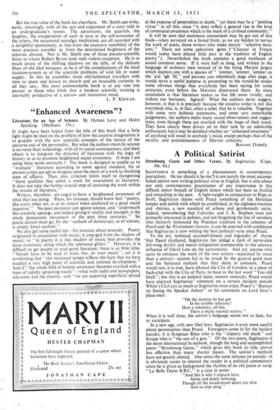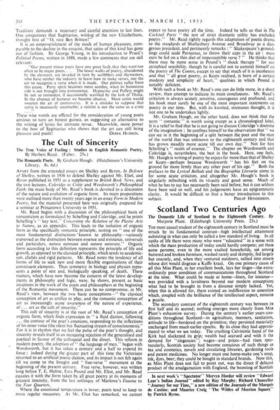A Political Satirist
&tom/talus is something of a phenomenon in contemporary journalism. He (or should it be she?) is not merely the most accomp- lished satirist now writing political verse in English, but is also about our only contemporary practitioner of any importance in this difficult minor branch of English letters which has been so fruitful and rewarding in the past. A light-weight in comparison to Pope or Swift, Sagittarius shares with Praed something of the Horatian temper and polish with which he established, in the eighteen-twenties and -thirties, a new standard of urbane and gentlemanly satire. Indeed, remembering that Calverley and J. K. Stephen, were not primarily interested in politics, and not forgetting the line of versifiers who formerly honoured the Praedian tradition in the columns of Punch and the Westminster Gazette, it can be asserted with confidence that Sagittarius is now writing the best political verse since Praed.
To the wit, technical accomplishment and ingenuity of rhyme that Piaed displayed, Sagittarius has added a dash of up-to-date left-wine devilry and moral indignation (comparable to the salutary influence of David Low on the cartoonists). And yet, anyone who cares to compare the work of the two writers—separated by more than a century—cannot fail to be struck by the general good taste and the balanced outlook that they share in common. Praed would not, it is true, have allowed the City of London, in a piece of back-chat with the City of Paris, to haxe as the last word "You old bitch"; but this is an isolated lapse; mutatis ntutanclis, Praed would have enjoyed Sagittarius' comment on a certain incident outside White's Club just as much as Sagittarius must enjoy Praed's "Stanzas on Seeing the Speaker Asleep" or his comments on Lord Grey's place-men:
"Oh the dainties he has got In his terrible refectory!
Here a colonelcy, all hot, There a nicely roasted rectory."
When it is well done, the satirist's language seems not to date, but to anticipate.
In a new age, with new libel laws, Sagittarius is even more careful about personalities than Praed. Foreigners come iii for the hardest knocks; it is Syngman Rhee who is the "slippery old shark" and Krupp who is "the son of a gun." Of the two poets, Sagittarius is the more international in outlook, though the long and accomplished poem "Strasbourg Geese," which gives this book its title, proves less effective than many shorter pieces. The satirist's methods have not greatly altered. One notes the same reliance on parody—it is obviously easier to interest the reader in a political commentary when he is given as background the rhythm of an old poem or song. "La Belle Dame B.B.C." is a case in point: "And this is why I sojourn here,
Alone and palely loitering, Though all the sound-proof doors are shut And no pips ping."
Tradition demands a necessary and careful attention to last lines. One conjectures that Sagittarius, writing of the new Elizabethans, thought first of "0, rare Ben Britten!"
It is an empoverishment of the stock of human pleasures, com- parable to the decline in the essayist, that satire of this kind has gone out of fashion. Sir George Young, in his introduction to Praed's Political Poems, written in 1888, made a few comments that are still relevant: "Our present minor poets have one great fault, that they want too often to be major poets.... The lower walks of poetry, abandoned by the cleverest, are invaded in turn by scribblers and rhymesters, who have neither the industry to learn how to make verses, nor the ear to recognize a verse when it is made. Our politics suffer from this cause. Party spirit becomes more sombre, when its humorous side is not brought into prominence. Hypocrisy and Puffery might be not so immodest, if occasionally scarified by the lash of Thalia. In the absence of humour we become abusive. More satire would sweeten the air of controversy. It is a mistake to suppose that satire is necessarily unamiable; a satirist is not the same as a cynic
. .
These wise words are offered for the consideration of young poets anxious to turn an honest guinea, as suggesting an alternative to the writing of lyrics for intimate revue. Meanwhile, more power to the bow of Sagittarius who shows that the art can still bring



































 Previous page
Previous page